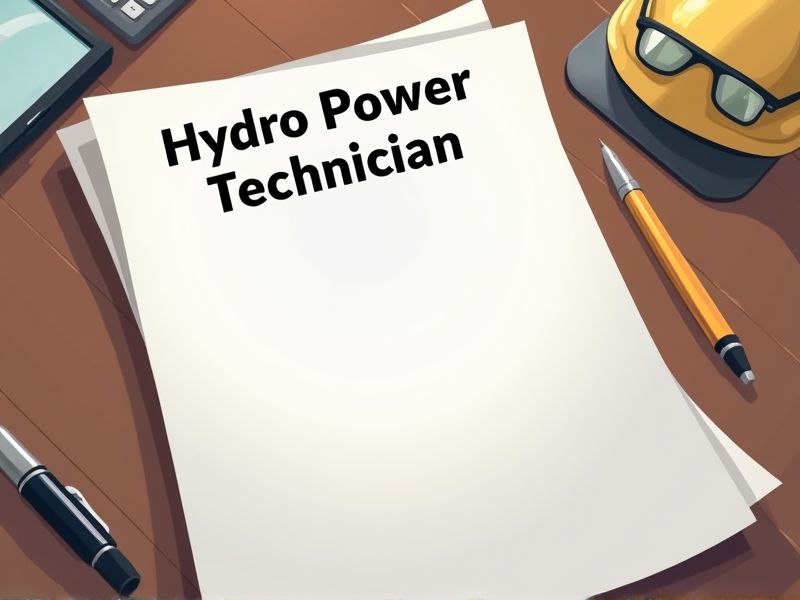
Hydro Power Technicians operate and maintain electrical systems within hydroelectric plants, requiring precise technical expertise. Certifications ensure technicians possess the necessary skills and knowledge to handle complex equipment safely. Compliance with industry standards and regulations often mandates such qualifications to mitigate operational risks and enhance reliability. Here are some important certifications you may need as a Hydro Power Technician.
Certified Hydro Power Technician (CHPT)
Hydropower installations involve complex electromechanical systems, and Certified Hydro Power Technicians (CHPT) possess specialized training to effectively manage these systems, reducing the risk of operational failures. Regulatory compliance in the hydropower sector mandates specific technical know-how, which CHPT certification ensures, fostering industry-standard safety and quality. CHPTs help in optimizing energy output by implementing efficient maintenance and repair techniques, increasing the overall efficiency of hydropower plants. CHPT designation enhances career prospects for technicians by validating their expertise, thus making them more competitive in the job market.
NICET Electrical Systems Certification
Hydropower technicians often work with complex electrical systems that require specific safety and operational standards, which NICET Electrical Systems Certification ensures they meet. The certification provides validation of a technician's expertise and skills, making them more reliable and credible in their field. It enhances job opportunities and can lead to career advancement as employers often seek certified technicians for their proven proficiency. Regulatory compliance often mandates that technical personnel hold recognized certifications, making NICET certification a critical credential.
OSHA 30-Hour General Industry Certification
Hydro power technicians often work in environments with high-risk situations, so obtaining the OSHA 30-Hour General Industry Certification helps to enhance safety awareness and reduce workplace accidents. This certification provides comprehensive training on hazard identification and prevention, crucial for handling equipment and maintaining hydroelectric systems safely. Companies are likely to prefer technicians with this certification because it demonstrates a proactive commitment to understanding safety protocols and compliance standards. Having this certification can also lead to improved job prospects and career advancement opportunities in the energy sector.
Lockout/Tagout (LOTO) Certification
Lockout/Tagout (LOTO) Certification is crucial for hydro power technicians because it ensures they understand and can implement safety protocols to prevent accidental machinery start-ups during maintenance. Failure to adhere to LOTO procedures can lead to serious injuries or fatalities, as technicians often work with high-voltage equipment and rapidly moving parts. By being certified, technicians are equipped to minimize the risk of energy releases, which safeguards both personnel and equipment. Regulatory compliance requires LOTO certification, ensuring a technician's adherence to legal standards and enhancing operational safety practices.
NFPA 70E Electrical Safety Certification
Hydro power technicians often work in environments where electrical hazards are prevalent, and the NFPA 70E Electrical Safety Certification provides critical safety guidelines to mitigate these risks. The certification ensures technicians are trained to identify electrical dangers, reducing the likelihood of workplace injuries or fatalities. Compliance with NFPA 70E standards helps organizations avoid legal repercussions and costly downtime caused by electrical accidents. Certified technicians are better equipped to safely maintain and troubleshoot electrical systems in hydroelectric facilities, enhancing overall operational efficiency.
Confined Space Entry Certification
Confined Space Entry Certification is crucial for hydro power technicians because it ensures they understand the risks and safety protocols associated with working in enclosed environments like turbine chambers. This certification reduces the likelihood of accidents caused by hazardous atmospheres or restricted physical access. Technicians equipped with this knowledge are better prepared to handle emergency situations, ensuring their safety and that of their colleagues. It also aligns with regulatory compliance requirements, which hold companies accountable for worker safety in potentially dangerous workspaces.
SCADA Systems Operation Certification
Earning a SCADA Systems Operation Certification provides Hydro Power Technicians with specialized knowledge crucial for managing automated systems efficiently. The certification ensures that technicians can monitor and control the real-time operations of hydroelectric power plants, leading to improved plant safety and reliability. Given the advancements in automation technology, technicians with certified skills can effectively troubleshoot and resolve system issues, minimizing downtime. As regulatory compliance becomes more stringent, the certification helps ensure adherence to industry standards, reducing the risk of operational fines or penalties.
Instrumentation and Control Systems Certification
Hydro power plants require precise monitoring of various parameters and Instrumentation and Control Systems Certification provides technicians the necessary skills to ensure that equipment operates efficiently and reliably. Proper certification equips technicians with the expertise to prevent system malfunctions, which reduces downtime and maintenance costs. Advanced qualifications in control systems enhance a technician's ability to quickly diagnose and address issues, improving overall plant safety. Certification validates technician competence, which is often a prerequisite for regulatory compliance in the energy industry.
First Aid & CPR Certification
Hydro power technicians often work in remote or hazardous environments where medical emergency services may be delayed, making first aid and CPR certification critical for immediate response. The physical nature of maintaining and repairing hydroelectric equipment poses a risk of accidents, which can be mitigated through trained initial intervention. Being certified empowers technicians to stabilize a situation until professional medical help arrives, potentially reducing the severity of injuries. Certification ensures compliance with safety regulations and enhances workplace safety culture, minimizing downtime and liability.
Renewable Energy Technician Certification
A Renewable Energy Technician Certification provides foundational knowledge about sustainable energy systems, ensuring that Hydro Power Technicians understand broader renewable energy contexts. This certification enhances their ability to work with innovative technologies, crucial as hydropower facilities integrate more advanced systems. Employers often prefer certified technicians as it signifies validated skills and commitment to industry standards. With policy shifts towards renewable sources, having this certification facilitates alignment with regulatory requirements and industry expectations.
Summary
When you obtain certifications as a Hydro Power Technician, your expertise will likely be recognized more readily in the industry. Increased qualifications can result in better job opportunities and potentially higher salaries. Your skills will align with industry standards, enhancing your ability to operate and maintain hydroelectric systems efficiently. Enhanced credentials might also lead to leadership roles or responsibilities in project management.
